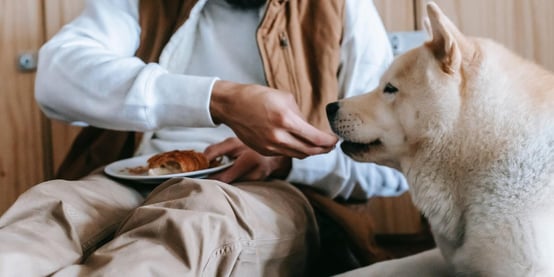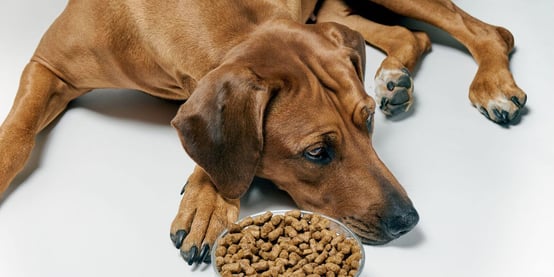If your cat is usually one to have a healthy (or hefty) appetite, a change in their eating habits may cause you some concern. Perhaps they are eating less than usual but seem otherwise healthy. What is going on?
There can be several reasons why your cat has less of an appetite, and it doesn’t always indicate a medical issue.
In this guide, we cover some of the common reasons why your cat might be eating less than usual, plus how to know when to (or not to) visit the vet.
1. Stress or anxiety
One of the most common causes of appetite change is stress. This may be due to a recent move, new pets in the home, or other disruptions to their daily routine.
Consider any recent changes to your cat’s environment. Did you recently move? Have a new baby? Experience a big storm? Such changes could cause your cat to have anxiety and thus, experience a change in their appetite.
.png?width=1600&height=800&name=FUR-Blog-Cat%20Eating%20Less%20than%20Usual%202%20(1).png)
Photo by Anna Kumpan on Unsplash
If you suspect that your cat may be stressed out, try to identify and eliminate the stressors. If you can’t remove the stressor, try making your cat more comfortable, such as petting or a comfy cat bed.
If the issue persists, consider consulting a veterinarian for guidance. They may be able to prescribe medication or stress management tips to help your cat feel less anxious.
2. Dietary changes
Another cause for appetite changes could be your cat’s diet. Any sudden change in meal plan, food quality, or flavour could lead to a decrease in appetite.
This could be as simple as an introduction to a new treat or as significant as changing their food completely. Even the most adaptable of cats can be affected by a slight change in diet.
.png?width=1600&height=800&name=FUR-Blog-Cat%20Eating%20Less%20than%20Usual%203%20(1).png)
Photo by Piotr Musioł on Unsplash
If you’ve recently changed your cat’s diet, consider switching back to your regular routine. Reduce or remove any treats or ingredients that seem to correlate with the appetite change.
If even after these changes the reduced appetite persists, consult your vet for advice. They might recommend a gradual transition plan or suitable alternatives.
3. Age
Aging cats may experience a decline in appetite. For one, older cats need fewer calories to sustain their growth and development compared to when they were younger. Also, older cats may have a reduced metabolism, again requiring fewer calories.
This may not necessarily be cause for concern unless your aging cat’s loss of appetite is due to another health problem, such as dental issues. In absence of any other issues, you can be fairly confident that eating less is just due to your cat getting older.
That said, regular veterinary check-ups for senior cats are crucial. Your vet will be able to advise on any age-related concerns or common issues. They might also recommend making adjustments to your cat’s diet.
4. Obesity
Your plump and furry friend might be an excellent cuddler, but weight issues could be affecting your cat’s appetite. Obesity is another common cause of reduced appetite.
“Cats are considered overweight when they weigh 10-20% above their ideal body weight… and are considered obese when they weigh more than 20% above their ideal body weight”.
Your cat may have less of an appetite because they are actually being overfed. Or, they may show a decrease in appetite as a result of reduced physical activity.
.png?width=1600&height=800&name=FUR-Blog-Cat%20Eating%20Less%20than%20Usual%204%20(1).png)
Photo by Anis Rahman on Unsplash
First, contact your vet to determine your cat’s ideal weight for their age and size. Then, weigh your cat to know whether your cat weighs significantly more than their ideal weight.
If you suspect that your cat is overweight or obese, consult with your vet to discuss weight management strategies. You can align on an appropriate diet plan to get your cat back to a healthy weight (and appetite)!
5. Illness
If your cat is eating less than usual and is experiencing other symptoms (such as lethargy, vomiting, or diarrhea), they might have an illness. Changes in their bathroom habits (frequency of using the litter box, etc.) may be another sign.
Any of these symptoms are reason enough to visit the vet. Consult your vet promptly to determine whether your cat is experiencing an illness. Some symptoms could be indicative of a more serious health problem, such as dental issues, gastrointestinal problems, or organ disorders.
6. Pain
Injury or pain can lead to a reduction in appetite. If your cat is recovering from a known injury, loss of appetite is common. But if you’re not sure why your cat is eating less – and suspect they might be in pain – it is certainly time to consult a vet.
Gently feel around your cat’s head, abdomen, and limbs. Notice whether they whine or wince with pain. Let your vet know where and how your cat may be experiencing pain.
Pain should never be ignored. Consult your vet for the appropriate diagnosis and treatment plan.
7. Medication
Some medications can cause a decrease in appetite as a side effect. If your cat has started any new medication, this could be why they are eating less than usual.
Look for changes in behaviour, reluctance to eat, or a sudden onset of reduced food intake. You can confirm with your veterinarian whether appetite changes are common with said medication.
.png?width=1600&height=800&name=FUR-Blog-Cat%20Eating%20Less%20than%20Usual%205%20(1).png)
Photo by Mykenzie Johnson on Unsplash
If you are worried about your cat’s lack of appetite, consult your vet. They may suggest alternative options or adjustments in dosage to minimize side effects.
Never adjust your cat's medication without consulting your vet first! It's important to find a balance between managing the condition the medication is meant to treat and minimizing the effects on your cat's appetite.
8. Dental issues
Dental issues can lead to a wide range of problems for cats. They may experience pain, drooling, gum decay, and, yes, loss of appetite.
Notice whether your cat appears to be uncomfortable when they are eating. Look out for any signs of gum or tooth decay (bad breath, pawing at the mouth, red/swollen gums,), and let your vet know if you notice any issues.
Dental issues require veterinary attention. Regular dental check-ups and cleanings can help prevent and address dental problems early. But, if your cat is already showing signs of dental issues, be sure to treat it as soon as possible so they are able to eat comfortably.
9. Medical conditions
If you’ve exhausted this list and still aren’t sure why your cat may be eating less than usual, it might be time to consider a more serious issue.
.png?width=1600&height=800&name=FUR-Blog-Cat%20Eating%20Less%20than%20Usual%206%20(1).png)
Photo by Đồng Phục Hải Triều on Unsplash
There are many medical conditions that can result in appetite loss. These include, but are not limited to:
- Dental problems (e.g. Gum disease, tooth decay, or oral infections)
- Gastrointestinal issues (e.g. inflammatory bowel disease, pancreatitis, or gastrointestinal infections)
- Kidney Disease
- Liver Disease/Hepatitis
- Urinary tract issues
- Hyperthyroidism
- Diabetes
- Cancer
- Infections (e.g. systemic infections or respiratory illnesses)
If your cat is consistently eating less, especially if accompanied by weight loss, consult your vet right away. They will conduct a thorough examination and run tests to diagnose the issue. Follow the recommended treatment plan provided by your vet.
When to Take Your Cat to the Vet
When deciding whether to visit the vet, consider the overall health of your cat, the duration of the reduced appetite, and the presence of other concerning symptoms. When in doubt, seeking professional advice is always recommended to ensure fast intervention and establish the appropriate care for your pet.
Is your cat experiencing an unexpected illness or medical issue? Furkin Pet Insurance may be able to help you cover the cost of diagnosis and treatment! Furkin members get up to 80% of their eligible expenses covered.
Featured Photo by Michael Sum on Unsplash



